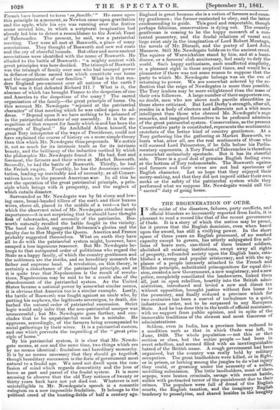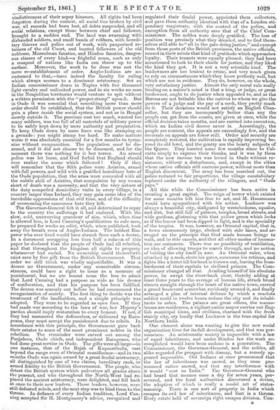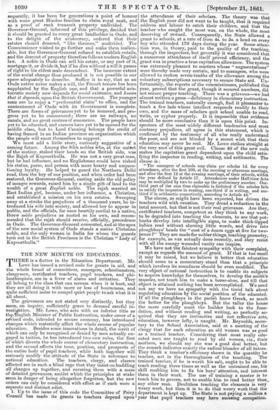THE REGENERATION OF OUDE.
IN the midst of the disasters, failures, party conflicts, and official blunders so incessantly reported from India, it is pleasant to read a record like that of the recent government of Oude. It is a story of which the nation may be proud, for it proves that the English dominion, even when based upon the sword, has still a vivifying power. In the short space of three years an English proconsul, of no marked capacity except to govern has utterly subjugated five mil- lions of brave men, one-third of them trained soldiers, abolished all existing institutions, swept away all rights of property, refounded society upon the English basis, esta- blished a strong and popular aristocracy, and with the ap- plause of a people intensely attached to the French and Idindoo principle, substituted primogeniture for equal divi- sion, created a new Government, a new magistracy, and a new police, completely conciliated the landowners, linked them all, just in open rebellion, heartily into the British admi- nistration, introduced and levied a new and direct tax without opposition, brought justice without fees home to the peasantry, and finally reduced a province which for two centuries has been a marvel of turbulence to a quiet, industrious order, not to be surpassed in any European State. And he has done this in the teeth of official resistance, with no support from public opinion, and in spite of the immovable traditions of the slowest and most timorous of administrations.
Seldom, even in India, has a province been reduced to a condition such as that in which Oude was left, in June, 1859. The whole population —not this or that section or class, but the entire people — had been in overt rebellion, and seemed filled with an inextinguishable hatred of the British name. A rough government had been. organised, but the country was really held by military occupation. The great landholders were killed, or in flight, or in prison, or lurking among the jungles to do what injury they could, or groaning under the necessity of a sullen, unwilling submission. The little landholders, most of them sepoys, were beaten criminals, savage with recent battle, sullen with protracted terror of the punishment due to their crimes. The populace were full of dread of the English courts, the English taxation, and the imaginary English tendency to proselytize, and shared besides in the haughty vindictiveness of their sepoy kinsmen. All rights had been forgotten during the contest, all social ties broken by civil war, all records had been lost, all debts suspended, and all social relations, except those between chief and follower, brought to a sudden end. The land was swarming with• disbanded soldiers, and small bands of robbers, with heredi- tary thieves and police out of work, with pauperized re- tainers of the old Court, and hunted followers of the old noblesse, Mussulman fanatics, and Hindoo fanatics, danger- ous classes of every kind—a frightful scum, such as only a cesspool of nations like India can throw up to the surface. Moreover, the work to be done was not the mere re-establishment of order. Anglo-Indians are ac- customed to that,—have indeed the faculty for ruling which always accrues to a dominant aristocracy. Set an Indian commissioner down in Naples with five thousand light cavalry and unlimited power, and in six weeks no man in the Neapolitan territories would venture to spit without a written permission with the "proper stamp" upon it. But in Oude it was essential that something more than mere order should be established, that the British power should gain a place ineide the social system, and not as in Bengal merely outside it. The province cost too much, wanted too many soldiers, was too full of all materials of military power to be safely kept down by mere authority and preparation. To keep Oude down by mere force was like stamping on a grenade : you might stamp too hard. To make matters worse it was absolutely essential for a few months to tyran- nize without compunction. The population must be dis- armed, and it did not choose to be disarmed, and for the moment there was nothing for it but terror. An armed police was let loose, and God forbid that England should ever realize the scene which followed ! Only if they will remember that the Sikh police were Asiatics, armed with full powers, and wild with a gratified hereditary hate of the Oude population, that the arms were concealed with all the subtle skill of Asiatics, that compulsion by any means short of death was a necessity, and that the very nature of the duty compelled domiciliary visits in every village, in a country larger than Ireland, they may gain some idea of the inevitable oppressions of that evil time, and of the difficulty of overcoming the rancorous hate they left.
The Governor-General felt it all, and determined to repay to the country the sufferings it had endured. With the slow, cold, unswerving grandeur of aim, which, when time is allowed him, is Lord Canning's qualification to rule men, he prepared for weeks an edict, which, when published, took away the breath even of Anglo-Indians. The boldest Em- peror who ever lived would have shrunk from such a decree. In a document occupying less than half a column of this paper he declared that the people of Oude had all rebelled, and that throughout the kingdom all rights to property whatsoever had ended. No ownership could thenceforth exist save by free gift from the British Government. That order we still think was wholly unjustifiable. It was a decree no Government, under any conceivable circum- stances, could have a right to issue as a measure of punishment, but we are bound none the less to admit that Lord Canning had a purpose as wide as his decree of confiscation, and that his purpose has been fulfilled. The decree was scarcely out before he had commenced the reorganization of society. The first thing to decide was the treatment of the landholders, and a simple principle was adopted. They were to be regarded as open foes. If they had made war according to the laws of war, her Majesty's pardon should imply restoration to every honour. If not, if they had massacred the defenceless, or delivered up Euro- peans, they must accept the punishment due to rebels. In accordance with this principle, the Government gave back their estates to some of the most prominent nobles in the rebellion. The remainder were carved out among the Punjabees, Oude chiefs, and independent Europeans, who had done great service in Oude. The gifts were all large—in one instance, that of the Rajah of Supoorthulla, vast beyond the range even of Oriental munificence—and in two months Oude was again owned by a great feudal aristocracy, all distinguished by one of two claims, hereditary rank, or armed fidelity to the British Government. The people, who detest the British system which pulverizes all grades above the peasant, and who throughout the North-West had re- placed the ancient aristocracy, were delighted, and fell back at once to their new leaders. Those leaders, however, were still defeated rebels, and the next step was to bind them to the throne. In defiance of every Indian tradition, Lord Can- ning accepted Sir H. Montgomery's advice, recognized and regulated their feudal power, appointed them collectors, and gave them authority identical with that of a London sti- pendiary magistrate, with the control of the police, and exemption from all authority save that of the Chief Com- missioner. The nobles were deeply gratified. The loss of position was precisely what they dreaded, and to find them- selves still able to "sit in the gate doing justice," and exempt from those pests of the British provinces, the native officials, roused in their minds that kind of gratitude which approaches loyalty. Their tenants were equally pleased: they had been accustomed to look to their chiefs for justice, and they liked the kind they got. It is not a very scientific kind. The landowners are too lenient to crime, and very much given to rely on circumstances which they know perfectly well, but which are not in evidence. They do, however, on the whole, very satisfactory justice. Almost the only moral rule really binding on a native's mind is that a king, or judge, or great landowner, ought to do justice when appealed to, and as the Barons are not bribable like the natives to whom we give the powers of a judge and the pay of a cook, they pretty much do it. Their decisions would not satisfy an English Chan- cellor, but they are incomparably better .than any the people can get from the courts, are given at once, while the official decision takes months, and are carried into execution, which an Indian civil decree never is. Accordingly, the people are content, the appeals are exceedingly few, and the reversals on appeals are fewer still. Order and security are completely restored, the cultivation is rapidly improving be- yond its old level, and the gentry are the hearty subjects of the Queen. They hurried some few months since to Cal- cutta simply to express their thanks, and it was by them that the new income tax was levied in Oude without re- sistance, without a disturbance, and, except in the cities where native officials still exercise power, without more than English discontent. The army has been marched out, the police reduced to fair proportions, the village constabulary replaced under the authority of the villagers, and " Oude Pays." All this while the Commissioner has been active in creating a great capital. The reign of terror which existed for some months left him free to act, and M. Hausmann would have sympathized with his action. Lucknow was always a beautiful city, disfigured by wretchedness, squalor, and dirt, but still full of palaces, temples, broad streets, and wide gardens, glistening with that yellow green which looks as if the leaves had been dipped in light, and is the speciality of the tropics. It was, however, an Oriental capital, that is, a town enormously large, choked with side lanes, and ar- ranged on the principle that God made human beings to walk, and to ride camels, and that all other modes of locomo- tion are nuisances. There was no possibility of ventilation, no idea of allowing troops to march through, and no notion of holding the city itself in awe. An Oriental ruler, when attacked by a mob, shuts his gates, summons his retinue, and fights like a ferret till his head is thrown out, leaving the bom- bardment of their capitals to civilized princes. The Com- missioner changed all that. Availing himself of his absolute power, he swept the river-bank clear, thereby adding at least three years to the average of human life, struck broad streets straight through the heart of the native town, carried a grand boulevard somewhat ruthlessly around it, and finally arranged a plan of internal defence by which a resolute soldier could in twelve hours reduce the city and its inhabi- tants to ashes. The palaces are great offices, the mauso- leums are residences, a vigilant natixe mayor carries out Eng- lish municipal ideas, and civilians, charmed with the fresh stately city, cry loudly that Lucknow is the true capital for Northern India.
One element alone was wanting to give the new social organization time for its full development, and that was per- manence. An aristocratic society is impossible with a law of equal inheritance, and under Ilindoo law the work ac- complished would have been undone in a generation. The Commissioner, the Governor-General, and the nobles, all alike regarded the prospect with dismay, but a remedy ap- peared impossible. Old Indians at once pronounced that the law of inheritance was sacred, as they once pro- nounced suttee sacred, and that any interference with it would "cost us India." The Governor-General who had heard that menace once a day for seven years, per- severed, and the local authorities discovered a device, the adoption of which is really a model act of states- manship. There is one sort of property in India which escapes its evil law of inheritance, and that is a throne. Every estate held of sovereign right escapes division. Con- sequently, it has been for generations a point of honour with some great Hindoo families to claim royal rank, and as a proof of rank transmit property undivided. The Governor-Genera], informed of this privilege, decided that it should be granted to every great landholder in Oude, and to the delight of the aristocracy, ordered that their estates should descend, "like thrones," undivided. The Commissioner wished. to go further and make them inalien- able, but the Governor-General refused to establish entails, and the descent of property therefore follows modern English law. A noble in Oude can sell his estate, or any part of it, mortgage it, or divide it, but if he dies without a will it passes of right to his eldest male descendant. The immense extent of the social change thus produced it is not possible in our space adequately to describe. Suffice it to say, that as an Oude native never makes a will, the French tenure has been supplanted by the English one, and that a powerful aris- tocratic society now depends for social existence, and knows that it depends, upon the British Government. The younger sons are to enjoy a "preferential claim" to office, and the contentment of Oude with its Government is complete. There are forms of grievances yet to be removed, and pro- gress yet to be commenced ; there are no railways, no canals, and no great centres of commerce. The people have yet to be educated, and careers have yet to be opened for the middle class, but to Lord Canning belongs the credit of baying framed in an Indian province an organization which the people will exert themselves to support. We must add a little story, curiously suggestive of a coming future. Among the Sikh nobles who, at the outset of the mutiny, staked their heads on the British side, was the Rajah of Kupoorthulla. He was not a very great man, but he had influence, and no Englishman could have risked his status, purse, and person with more hearty and unques- tioning loyalty. He helped to guard the Northern Delhi road, then the key of our position, and when order had been restored, the Governor-General, casting aside the old policy of meagre rewards, raised him by a single gift of land to the wealth of a great English noble. The rajah married an East Indian girl, became, under her influence, a Christian, and established a mission on his own estates. Sweeping away at a stroke the prejudices of a thousand years, he in- troduced his wife into society, and allowed her to appear in public, and the officials, for once heartily cordial to a native, threw aside prejudices as rooted as his own, and recom- mended that the rajah should receive, officially, precedence in Oude. The Governor-General consented, and at the apex of the new social system of Oude stands a native Christian nob)e, and the only woman in India for whom the guards turn out in the British Provinces is the Christian "Lady of Kupoorthulla."
































 Previous page
Previous page